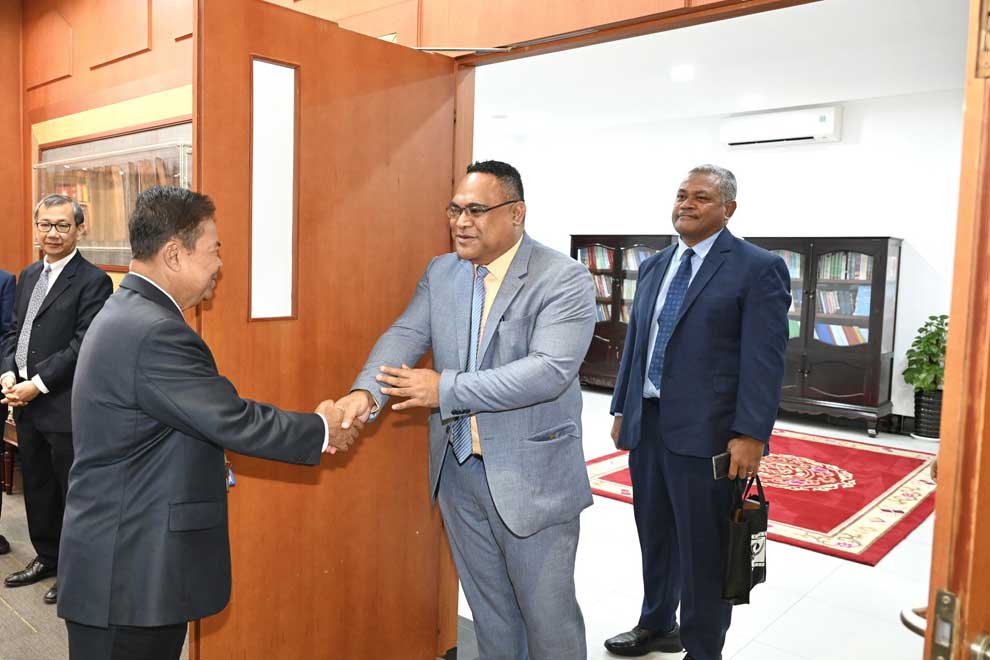
NBC governor Chea Chanto (second left) shakes hands with his CBSI counterpart Luke Forau as the RBF’s Esala Masitabua (right) waits for his turn. NBC
The National Bank of Cambodia’s (NBC) new deals with the central banks of two Pacific archipelago nations signal the government’s commitment to expanding the payment system and the development of financial innovation, according to financial industry representatives.
The NBC announced that it entered into two separate memorandums of understanding (MoU) on February 23 with the Central Bank of the Solomon Islands (CBSI) and Reserve Bank of Fiji (RBF) to strengthen “Cooperation in the Area of Financial Innovation and Payment Systems”.
The two documents were penned at a ceremony held in Phnom Penh by NBC governor Chea Chanto, his CBSI counterpart Luke Forau, and RBF deputy governor Esala Masitabua, the Cambodian central bank noted in a statement later that day.
In his welcome remarks, Chanto hailed each MoU as a “milestone” for the involved central banks, saying that the agreements will entail utilising advanced technologies to prop up financial cooperation and benefit the peoples of all three nations, according to the statement.
“The main purpose of this MoU is to focus on the cooperation in developing the financial innovation and payment system, and to share related information on innovation and digital payments in financial services for our respective markets and provide a platform for technical cooperation to stimulate the aforementioned collaboration through the exchange of experiences and knowledge,” he was quoted as saying.
Cambodia Microfinance Association chairman Sok Voeun lauded the MoUs, which he suggested will pave the way for a more convenient payment system and additional forms of financial cooperation.
“I hope the three central banks will learn more from each other, sharing knowledge and experience in terms of digital transactions,” he said, bringing up as a notable Cambodian achievement the NBC’s Bakong, a blockchain-based payment system infrastructure officially launched in October 2020.
Speaking to The Post on February 26, Cambodia Post Bank Plc (CPBank) CEO Toch Chaochek argued that the new partnerships – which he likened to “win-win strategies” – could help bring in investors and tourists from Fiji and the Solomons, and make financial transactions easier among businesspeople and the general population.
“We can all learn and share from each other. We realise that financial payment systems in Cambodia can be a bit more advanced than elsewhere, and that’s why some countries wish to learn from us,” he stated.
For the record, the Ministry of Tourism tallied 132 Fijian visitors to the Kingdom last year, up from just three in 2021 but down from 543 in 2019 – respectively the lowest and highest annual figures given for the 2011-2022 period, with the next highest numbers given at 393 in 2017, and 262 in 2018.
Of the 2022 total, the majority had their purpose of visit marked as “holiday”, at 102 or 77.27 per cent, followed by “business” (29; 21.97%) and “others” (1; 0.76%) – compared to 2019 with 409 holiday (75.32%), 75 business (13.81%), and 59 others (10.87%).
The corresponding statistics for Solomon Islanders were not immediately available.
Speaking in the statement, RBF’s Masitabua said that “the MoU provides a platform for free sharing of information and collaboration that will assist Fiji’s journey in the development of a modern, efficient, and reliable digital payment system to support the needs of the people.
“This collaboration will further support the ongoing national payments reforms and allow Fiji to leapfrog in its journey in the use of technology to support finance sector development,” he added.
CBSI’s Forau affirmed the Solomons’ keenness to work with the NBC and learn from the Kingdom’s experiences with using sophisticated technologies to benefit the people, the statement said.
“Cambodia has given us an opportunity to learn from its leadership in the use of technology and, in addition to that, has committed through the MoU to cooperate in developing payment systems that [make it easier for] ordinary people to make payments and receive funds with minimal delays,” he was quoted as saying.
On February 20, NBC assistant governor Chea Serey reported that the number of accounts with the Bakong system has topped the 8.5 million mark, as the Cambodian digital-payment landscape continues to improve.
Serey shared that 8.5 million accounts “have been using” Bakong e-wallets, with direct and indirect users accounting for around 0.5 million and eight million, respectively. “Bakong is not just for payment, customers can use [it for] health monitoring,” she said.
As of September, more than 0.5 million customers accounted for transactions in the Bakong system worth $1.2 billion, while direct and indirect transactions totalled two million, she added.
For comparison, Nikkei Asia reported that, through partnerships between the NBC and local banks to operate Bakong and boost adoption, the currency had reached 7.9 million Cambodians by November, directly or through apps offered by partner lenders.
Since its inception, about 6.8 million transactions had been made through Bakong as of November, clocking in at around $2.9 billion, the financial outlet said.
The February 23 NBC statement explained that Bakong “is a project that explores the use of an alternative technology platform to address the lack of interconnectivity and interoperability, and attain efficiencies within the current payment system. It is also aimed at promoting financial inclusion and the use of Khmer riel.
“Currently, there are 70 members participating in the Bakong system, amongst them are 46 members that are currently under development and 24 members are in technical integration,” it said.












